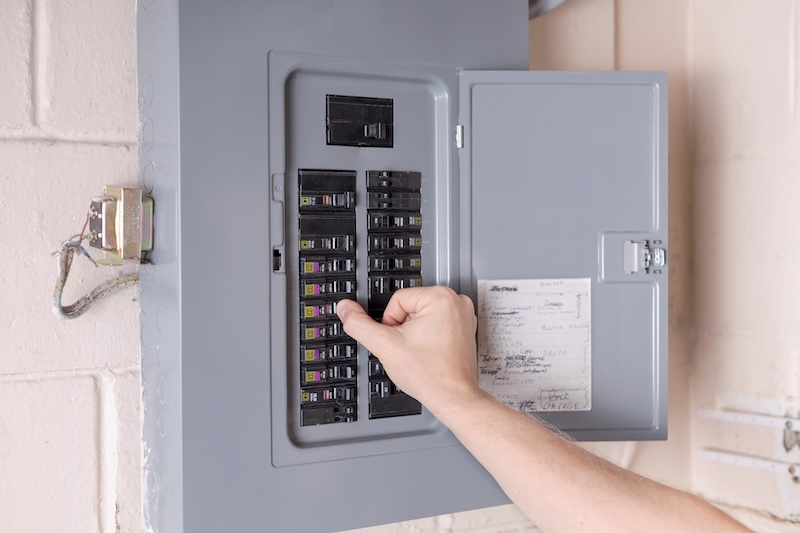You’re standing in your basement or garage, staring at that metal box on the wall. Maybe a breaker just tripped, or perhaps you’re wondering if your panel can handle that new hot tub you’ve been eyeing. That unassuming gray cabinet is actually your home’s electrical command center, and knowing how it works can save you from headaches, safety hazards, and costly repairs down the road. Most homeowners never think about their electrical panel until something goes wrong.
The lights flicker, an outlet stops working, or suddenly half the house goes dark during movie night. At NTX Electric, we’ve seen countless situations where a basic understanding of electrical panels would have helped homeowners identify issues early or avoid problems altogether. Your electrical panel deserves more attention than it typically gets because it’s working around the clock to keep your home safe and powered.
The truth is, your electrical panel isn’t as mysterious as it might seem. While you should always call a licensed electrician for repairs or modifications, understanding the basics helps you make informed decisions about your home’s electrical system and recognize when professional help is truly necessary.

What Your Electrical Panel Actually Does
Think of your electrical panel as a sophisticated traffic controller for electricity. Power enters your home through the main service line, flows into the panel, and gets distributed through individual circuits to different areas of your house. The panel’s main job is distribution, but its most critical function is protection. When something goes wrong in your electrical system, the panel acts as your first line of defense against electrical fires and damage.
Modern electrical panels typically contain circuit breakers rather than the old-fashioned fuses your grandparents might remember. These breakers are designed to trip automatically when they detect too much current flowing through a circuit. This automatic shutoff prevents wires from overheating and potentially starting a fire. According to the National Fire Protection Association, electrical failures or malfunctions cause an estimated 13% of home fires annually, making your panel’s protective role genuinely lifesaving.
Understanding Breakers and Circuits
Each breaker in your panel controls a specific circuit, which is essentially a loop of wiring that delivers power to outlets, lights, or appliances in your home. Breakers come in different sizes, measured in amperes or amps, based on how much electrical load they need to handle. A typical bedroom circuit might use a 15-amp breaker, while your kitchen outlets probably run on 20-amp breakers. Large appliances like electric dryers or air conditioners often require dedicated 30 or 50-amp breakers.
When a breaker trips, it’s doing its job. Something caused too much current to flow through that circuit, whether it’s a faulty appliance, too many devices plugged in at once, or a short circuit somewhere in the wiring. Resetting a breaker occasionally is normal, but if the same breaker keeps tripping, that’s your panel telling you there’s a problem that needs professional attention.
Common Panel Issues Every Homeowner Should Know
Older homes often have electrical panels that simply can’t meet modern power demands. If your panel is more than 25 years old, contains a fuse box instead of breakers, or you notice frequent tripping, it might be time for an upgrade. Homes built before 1990 typically have 100-amp service, while today’s homes usually need at least 200 amps to handle computers, kitchen appliances, HVAC systems, and electric vehicle chargers.
Watch for warning signs like buzzing sounds from the panel, a burning smell, visible rust or corrosion, or breakers that feel hot to the touch. These symptoms indicate serious issues that require immediate professional evaluation. Similarly, if you find yourself using extension cords throughout your house because you don’t have enough outlets, your circuits are likely overloaded, putting stress on your entire electrical system.
Taking the Next Step
Your electrical panel works tirelessly to keep your home safe and functional, but it needs proper maintenance and occasional upgrades to do its job effectively. Understanding how it works empowers you to spot potential problems early and make smart decisions about your home’s electrical infrastructure.
Whether you’re concerned about an aging panel, experiencing frequent breaker trips, or planning renovations that will increase your electrical load, NTX Electric is here to help. Our experienced electricians can evaluate your current panel, explain your options clearly, and ensure your home’s electrical system meets both safety standards and your family’s needs. Don’t wait until a small issue becomes a major problem. Contact NTX Electric today for a professional electrical panel inspection and enjoy the peace of mind that comes with a safe, reliable electrical system.
